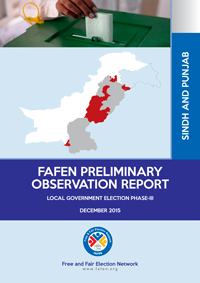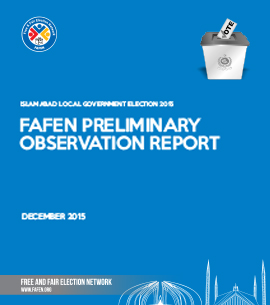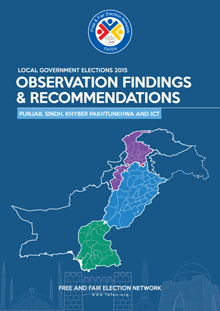The third and last phase of the local government (LG) elections concluded on December 5, 2015 with citizens in 18 districts of Punjab and Sindh voting for their local councilors in an election that was by far the most chaotic and disorderly of all the phases of LG elections in the two provinces and Islamabad, reinforcing the need for greater and binding powers for the Election Commission of Pakistan (ECP) to ensure that the executive complies with its legal and regulatory instructions in the letter and spirit, says FAFEN Preliminary Observation Report on Local Government Election Punjab and Sindh Phase III.
Albeit issues with the management of results, a relatively well-organized voting process in Islamabad Capital Territory had raised expectations that the ECP would maintain standards of enforcement in the third phase in the two provinces, but the case was quite to the contrary. The last minute deployment of Rangers, who were also given magisterial powers, could not ensure a smooth conduct of election in Karachi, which remained the focus of media attention throughout the day for incidences of brawls and blows among party workers.
Polling in the third phase of election was initially scheduled for December 3, 2015 but later ECP extended the polling date through a Notification on 22 October, 2014 when a religious party pointed out that the scheduled polling day was coinciding with the Chehlum of Hazrat Imam Husain and thousands of voters would potentially not be able to exercise their right to vote.
The accreditation for Free and Fair Election Network’s (FAFEN) observers was significantly well coordinated and streamlined as the ECP had finalized standard operating procedures (SOPs) of the accreditation process with civil society organizations and had duly informed the election officials in districts through letters to drive out any kinks in the process. All the DROs and DECs cooperated with the FAFEN partner organizations in their respective districts for the issuance of the accreditation cards.
To download the complete report, click here




